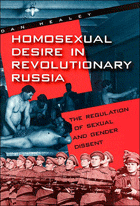
Our literary reviewer, Gene Hayworth, turns his attention to a very interesting time in history in a most unusual place—revolutionary Russia—with his review:
Homosexual
Desire in
Revolutionary Russia :
the Regulation of Sexual and Gender Dissent
the Regulation of Sexual and Gender Dissent
| Gene
Hayworth grew up in North Carolina and attended undergraduate school at
UNC - Greensboro. He worked for 10 years as a layout artist, technical
writer, computer specialist and training instructor before returning to
school at the University of Rochester, where he received a Masters
degree in English with a concentration in creative writing, and an MLS
from Syracuse University. He moved to Colorado in 1995 and worked at
CARL Corporation for several years, and in the summer of 1999 he worked
for CARL in Singapore, which resulted in the publication of an article
about his experiences titled "Singapore Libraries Usher in a New Era,"
in Computers in Libraries, 20:6 (Nov./Dec. 2000). He is an avid reader
and has written several book reviews for Colorado Libraries. In
February 2003 he prepared an exhibit at the Fales Library, NYU, on the
Gay American novelist and playwright Coleman Dowell. His critical study
of Dowell appeared in The Review of Contemporary Fiction, Fall, 2002.
Currently he works as a reference librarian for the University of
Colorado at Boulder Libraries. Gene Hayworth would like to hear from you about this review. If you are a writer or publisher with a literary offering or work of non-fiction, please contact Gene directly with your request for a review. |
 Homosexual
Desire in Revolutionary Russia: the Regulation of Sexual and Gender
Dissent Homosexual
Desire in Revolutionary Russia: the Regulation of Sexual and Gender
Dissentby Dan Healey University of Chicago Press, 2004 376 pages ISBN 0-226-32234-3 paper, $30.00 Reviewed by Gene Hayworth. Under anti-sodomy legislation passed in the USSR in 1934, a law that remained in effect for fifty-nine years, between 60,000 and 250,000 men were convicted and imprisoned for sodomy. The number of homosexuals arrested during this period is hard to determine, largely because of strict government control over historical documents and the lack of available statistics or police records. Dan Healey’s engaging historical study, Homosexual Desire in Revolutionary Russia, investigates the effects of such government control on the lives of homosexual dissidents during the decades before and after the 1917 Bolshevik Revolution. Because historians of this region have most often concentrated on the nation rather than the individual, Healey’s study of sexual and gender dissent, framed in an historical context that included mass famine and political upheaval, represents a unique and valuable inquiry into the intimate aspects of personal life in Russia from 1870 through the 1990s. The book focuses on the homosexual subcultures of St. Petersburg and Moscow. Using records and archives available to researchers only since the fall of Communism, Healey offers evidence that the late Tsarist regime and revolutionary rulers were ambivalent toward gay men and lesbians. The author has organized the material into three parts, “Same-sex Eros in Modernizing Russia,” “Regulating Homosexual Desire in Revolutionary Russia,” and “Homosexual Existence and Existing Socialism.” Healey discusses same-sex relationships and the development of a homosexual subculture, analyzing the differences in the male and female cultures that emerged. Part two provides an intriguing account of policing efforts and a succinct discussion of laws related to homosexuality before and after 1917. Healey is adept at explaining the political views of homosexuality that led in part to the emergence of a compulsory heterosexuality in the Communist Party. It is interesting to note that the medical and psychological discussions concerning deviance, perversion, and perversity were not far removed from similar debates held in the United States during same period. Homosexual Desire in Revolutionary Russia is the first full-length study of same-sex love in any period of Russian or Soviet history. The black and white photographs included in the book, which include staged bathhouse scenes by Karl K. Bulla and candid shots of bachi, young boys from Uzbekistan who served as itinerant entertainers and male prostitutes, reinforce the diversity of gay and lesbian culture throughout history. Healey’s thorough research and broad scope make this an essential text for students of both GLBT history and Russian culture. Dan Healey is a lecturer in history at the University of Wales Swansea. In 1998 he received his Ph.D. in Russian Language and Literature from University of Toronto. He has published articles and chapters about lesbians and Soviet psychiatry, male prostitution in early 20th-century Russia, homosexual identity as resistance in Stalin's Soviet Union, and queer historiography on the Soviet Union. He is currently working on a study of sexual disorder and forensic medicine in revolutionary Petrograd and Sverdlovsk. |